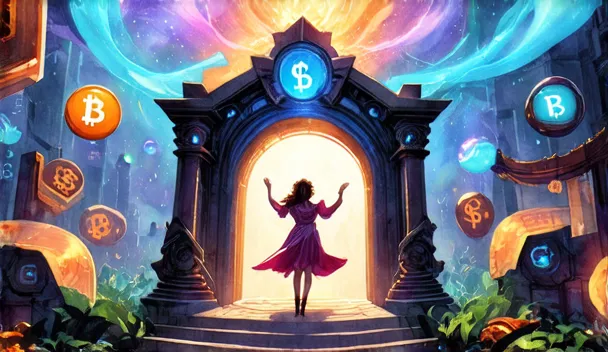What is an NFT Aggregator

The rise of blockchain technology has led to a proliferation of digital marketplaces, each offering a unique take on non-fungible tokens (NFTs).
As the NFT ecosystem continues to expand, users are faced with the daunting task of navigating multiple platforms to find, buy, and sell these digital assets.
This is where NFT aggregators come into play - centralized hubs that unite disparate marketplaces under one roof, streamlining user interactions and unlocking the full potential of the NFT space.
Unlocking the Power of NFT Aggregators: A Centralized Hub for Digital Assets
Connecting Multiple Marketplaces for a Unified Experience
NFT aggregators serve as a central hub, connecting multiple marketplaces and providing users with a seamless experience. Imagine being able to browse through various online stores from one convenient location - that's what NFT aggregators do for digital assets.
By integrating data from multiple platforms, these aggregators offer a comprehensive overview of the NFT market, allowing collectors and buyers to discover new opportunities and make informed decisions.
This unified approach eliminates the need to navigate between different websites and apps, streamlining the process of buying, selling, and trading unique digital assets.
Benefits of Centralized NFT Management with an Aggregator Platform
A centralized hub for digital assets, such as an NFT aggregator platform, offers numerous benefits to collectors and creators alike. For one, it streamlines the process of buying, selling, and managing multiple NFTs across various marketplaces.
This consolidation simplifies the user experience, much like how a single app on your phone aggregates all your social media feeds, making it easier to navigate and engage with different platforms.
Additionally, an aggregator platform can provide a unified interface for tracking NFT ownership, sales history, and provenance - akin to having a digital wallet that securely stores and organizes your cryptocurrency holdings.
The Future of Digital Ownership: How NFT Aggregators Are Shaping It
NFT aggregators are revolutionizing the way we think about digital ownership. By providing a centralized hub for buying, selling, and trading unique digital assets, these platforms are unlocking new possibilities for creators, collectors, and enthusiasts alike.
Imagine being able to browse a vast virtual library of one-of-a-kind art pieces, rare in-game items, or exclusive music releases - all under one roof. NFT aggregators make this a reality, allowing users to explore, acquire, and showcase their digital treasures with unprecedented ease and flexibility.
Key Features that Define the NFT Aggregator Experience

Unified Interface: A Single Hub for Diverse NFT Marketplaces
An NFT aggregator's unified interface serves as a central gateway, seamlessly integrating multiple marketplaces into one cohesive platform. Imagine having the ability to browse and purchase NFTs from various platforms like OpenSea, Rarible, or SuperRare without leaving a single site - that's what an NFT aggregator offers.
This streamlined experience eliminates the need for users to juggle multiple accounts, navigate different interfaces, and manually track market performance across disparate platforms. By providing a unified interface, aggregators simplify the process of discovering, buying, and selling unique digital assets, making it more accessible and enjoyable for collectors and enthusiasts alike.
Real-Time Price Tracking and Alerts for Informed Decision Making
A key feature that defines the NFT aggregator experience is real-time price tracking and alerts, which empowers users to make informed decisions in the rapidly evolving digital marketplace.
This feature allows collectors and investors to stay up-to-date with the latest market trends, receive instant notifications when their desired assets reach a certain price threshold or exceed their target valuation, and swiftly act on opportunities that align with their investment strategies.
Similar to how stock traders use real-time data feeds to navigate fluctuating markets, NFT aggregators provide users with a comparable level of market awareness, allowing them to capitalize on potential gains while minimizing the risk of losses.
Multi-Chain Support for a Broad Range of NFT Listings
A key feature that defines the NFT aggregator experience is its ability to support multiple blockchain platforms.
This means that users can access and trade NFTs from various ecosystems, such as Ethereum, Flow, and Solana, all in one place. Think of it like a multi-store shopping mall where you can browse and buy products from different brands under one roof.
By aggregating listings from diverse chains, the platform provides a more comprehensive and inclusive marketplace for NFT enthusiasts to explore, discover, and acquire unique digital assets.
Streamlining NFT Transactions: How Aggregators Simplify Buying and Selling

Simplified Browsing Across Multiple Marketplaces with a Unified Interface
Imagine you're searching for a rare book across multiple online stores, each with their own unique interface and search functionality. This is similar to the challenge NFT enthusiasts face when browsing various marketplaces in search of specific digital assets.
However, NFT aggregators simplify this process by providing a unified interface that aggregates listings from multiple marketplaces, making it easier for buyers to find what they're looking for and for sellers to reach a broader audience.
Streamlining the Process of Discovering New NFTs
Imagine browsing a vast, online art gallery where every piece is unique and has its own story to tell.
This is what NFT aggregators offer - a one-stop platform for discovering new digital treasures. By pooling together listings from various marketplaces and platforms, these aggregators simplify the process of finding rare gems or trending pieces.
Users can filter through a vast array of NFTs based on criteria such as price range, artist, or category, much like searching for a specific book on an online bookstore. This streamlining not only saves time but also exposes buyers to a broader spectrum of artists and collectors, fostering a more inclusive and vibrant digital art ecosystem.
Effortless Transactions Thanks to Multi-Marketplace Support
NFT aggregators revolutionize the way users buy and sell non-fungible tokens by providing seamless multi-marketplace support. Imagine being able to browse and purchase NFTs from various marketplaces, all within a single platform - no more juggling multiple tabs or accounts!
Aggregators streamline this process, allowing users to explore a vast pool of unique digital assets without the hassle of navigating disparate platforms.
For instance, an aggregator might integrate popular marketplaces like OpenSea, Rarible, and SuperRare, giving collectors instant access to a broader range of NFTs than any single platform could offer.
Enhancing User Experience with NFT Aggregators: Benefits and Advantages

Enhanced Browsing Experience: Simplified Navigation Across Marketplaces
Navigating multiple NFT marketplaces can be overwhelming, with each platform offering unique features and interfaces.
This is where NFT aggregators shine by providing a unified browsing experience across various marketplaces. Imagine having a single portal to search, discover, and purchase NFTs from multiple platforms, much like how online travel agencies (OTAs) allow users to compare prices and book flights from different airlines.
By simplifying navigation, NFT aggregators enable users to focus on finding the perfect digital asset rather than getting bogged down in platform-specific searches.
Unified Interfaces for Easy Discovery and Acquisition of Rare NFTs
NFT aggregators provide a unified interface that simplifies the discovery and acquisition of rare non-fungible tokens (NFTs). Imagine browsing a curated online store, where all your favorite collectibles are showcased in one place. That's what an NFT aggregator does for digital art, music, and other unique assets.
By pooling together NFTs from various marketplaces and platforms, these aggregators offer users a single, intuitive interface to explore, purchase, and manage their rare digital treasures.
This streamlined experience eliminates the need to navigate multiple platforms, making it easier for collectors to find and acquire the NFTs they desire.
Improved User Engagement with Personalized NFT Recommendations
NFT aggregators can revolutionize the way users interact with digital collectibles by providing personalized recommendations.
Imagine having a curated feed of unique NFTs that resonate with your interests, much like how social media platforms suggest content based on your preferences.
By leveraging AI-powered algorithms and machine learning, NFT aggregators can analyze user behavior and tailor recommendations to individual tastes.
This not only enhances the overall user experience but also increases engagement and encourages users to explore new and exciting digital art forms.
For instance, if a user has shown interest in rare collectibles, an aggregator might suggest limited-edition NFTs from emerging artists or exclusive collaborations.
The Impact of NFT Aggregators on Digital Asset Discovery and Liquidity

Simplifying Digital Asset Discovery through Unified Interfaces
NFT aggregators play a crucial role in streamlining digital asset discovery by providing unified interfaces that consolidate information from multiple platforms.
This simplifies the process for buyers and collectors, who no longer need to scour various marketplaces to find unique assets. Imagine having a single search engine that aggregates listings from eBay, Amazon, and Etsy - that's what NFT aggregators do for digital art, collectibles, and other non-fungible tokens.
By unifying disparate sources of information, these platforms reduce friction in the discovery process, making it easier for users to find specific assets or explore new types of digital content.
Boosting Liquidity by Aggregating Listings from Multiple Marketplaces
NFT aggregators play a crucial role in enhancing liquidity in the digital asset market by pooling listings from various platforms.
This aggregation enables buyers to browse and purchase NFTs from multiple sources, increasing the overall supply of assets available for sale. Think of it like an online shopping mall where you can find products from different stores under one roof.
Similarly, NFT aggregators bring together listings from disparate marketplaces, making it easier for collectors to discover new digital assets and for sellers to reach a broader audience.
By centralizing these listings, aggregators create a more liquid market, allowing buyers and sellers to transact with greater ease and efficiency.
Real-Time Listings for an Always-Up-to-Date NFT Marketplace Experience
NFT aggregators enable real-time listings, providing users with a seamless and up-to-date marketplace experience.
This means that as new NFTs are minted or existing ones change ownership, the aggregator's platform reflects these updates in real-time. Imagine browsing a dynamic online catalog, where fresh inventory is constantly being added, much like scrolling through a social media feed.
This real-time functionality ensures that buyers can discover and purchase newly listed digital assets instantly, while sellers benefit from increased visibility for their NFTs.
Navigating Challenges and Opportunities in the Evolving NFT Ecosystem

Addressing Scalability and Interoperability Challenges in the NFT Ecosystem
The NFT ecosystem is not without its challenges, particularly when it comes to scalability and interoperability. As more creators and collectors enter the market, the need for seamless interactions between different blockchain platforms and marketplaces becomes increasingly important.
Think of it like trying to connect multiple islands with bridges - each island (or platform) has its own unique landscape and rules, but they all need to be connected in order to facilitate smooth travel (or transactions).
To address these challenges, NFT aggregators can play a crucial role by providing standardized interfaces for different platforms to interact, enabling faster and more efficient transactions. This, in turn, can help drive mainstream adoption of NFTs and unlock their full potential.
Mitigating the Impact of Market Volatility on Aggregator Platforms
Market volatility can pose significant challenges to NFT aggregator platforms, as fluctuating prices and changing market conditions can impact the value of aggregated assets. To mitigate this risk, aggregators can implement various strategies, such as diversification, hedging, and dynamic pricing.
By spreading investments across multiple assets, markets, or sectors, aggregators can reduce exposure to any one particular market's volatility. This approach helps to minimize potential losses and maintain a more stable overall value.
Employing hedging techniques, like options or futures contracts, can also help offset potential losses during periods of market downturn. Additionally, dynamic pricing strategies can be used to adjust asset prices in real-time, reflecting changing market conditions and helping to maintain the aggregator's overall value.
Regulatory Compliance Strategies for Navigating a Rapidly Changing Landscape
As NFT aggregators continue to disrupt traditional markets, regulatory bodies are increasingly scrutinizing the space. To navigate this rapidly changing landscape, aggregators must adopt proactive compliance strategies.
One effective approach is to establish clear guidelines and standards for content creators, ensuring they understand what constitutes compliant assets. This can be achieved by implementing robust KYC (Know Your Customer) and AML (Anti-Money Laundering) protocols, similar to those employed in the traditional financial sector.
Additionally, aggregators can engage with regulatory bodies to provide education and insights on the benefits of NFTs, fostering a collaborative environment that promotes innovation while ensuring compliance.
Conclusion
In this article, we explored the concept of NFT aggregators and their role in shaping the future of digital ownership. We discussed how these platforms provide a centralized hub for connecting multiple marketplaces, streamlining transactions, and enhancing user experience.
Key features such as unified interfaces, real-time price tracking, and multi-chain support were highlighted as defining characteristics of the NFT aggregator experience. By simplifying digital asset discovery and boosting liquidity, NFT aggregators are poised to play a significant role in the evolving NFT ecosystem.
As the landscape continues to shift, it's essential for users, developers, and regulators to navigate challenges and opportunities together. With their potential to unlock new use cases and improve user engagement, NFT aggregators are an exciting development in the blockchain space, marking a significant step forward for digital ownership and beyond.